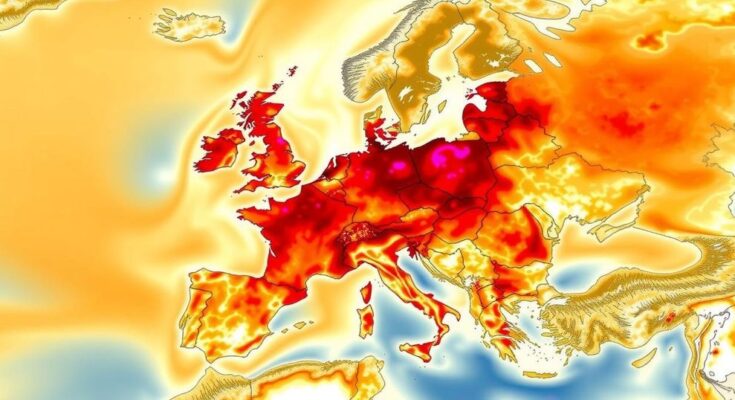European scientists have predicted that 2024 will set records as the hottest year, with temperatures likely to surpass 1.5 degrees Celsius above pre-industrial levels. Major climatic events, attributed to human-induced changes, include severe droughts, floods, and extreme heat that have affected various regions globally. Despite potential cooling in 2025, high temperature events are expected to persist, necessitating continued efforts to combat climate change.
European Union scientists have announced that the year 2024 is on track to be the hottest year recorded, with temperatures continuing to rise through early 2025. The Copernicus Climate Change Service (C3S) confirmed that, as of November, global average temperatures are poised to exceed 1.5 degrees Celsius above the 1850-1900 pre-industrial average. This marks a significant milestone in climate change, surpassing the previous record set in 2023. Severe weather events, including prolonged droughts, fatal flooding, and harsh heatwaves, have struck various parts of the world, with human-induced climate change being identified as a contributing factor to these disasters. Last month also recorded the second-warmest November on record, indicating an ongoing trend of elevated temperatures. While 2025 may exhibit slightly lower temperatures if a La Niña phenomenon occurs, it remains crucial to acknowledge that the risks of extreme weather conditions, such as heatwaves and cyclones, will persist.
The alarming trends in global temperatures highlight the ongoing climate crisis that has escalated over recent decades. The Copernicus Climate Change Service (C3S), which tracks climate data for the European Union, provides detailed insights into changes in global temperatures dating back to 1940. The latest findings not only emphasize the significance of record-breaking heat in 2024 but also underline the urgent need for effective climate policies. This call for action is amplified following recent United Nations climate negotiations, which resulted in a considerable financial package intended to assist nations grappling with the consequences of climate change, yet many argue that it is insufficient. Scientific consensus indicates that human activities, primarily through the emission of carbon dioxide from fossil fuels, have been pivotal in driving climate change and the associated severe weather phenomena observed worldwide.
In conclusion, the year 2024 is projected to become the warmest year on record, highlighting the critical urgency of addressing climate change and its far-reaching effects. The Copernicus Climate Change Service’s findings serve as a stark reminder of the acceleration of global warming and the extreme weather conditions linked to it. Stakeholders must prioritize investment in comprehensive measures to mitigate climate-related risks and safeguard the planet against further environmental degradation. The acknowledgment of human responsibility in climate change underscores the need for collective action to foster a sustainable future.
Original Source: stratnewsglobal.com




